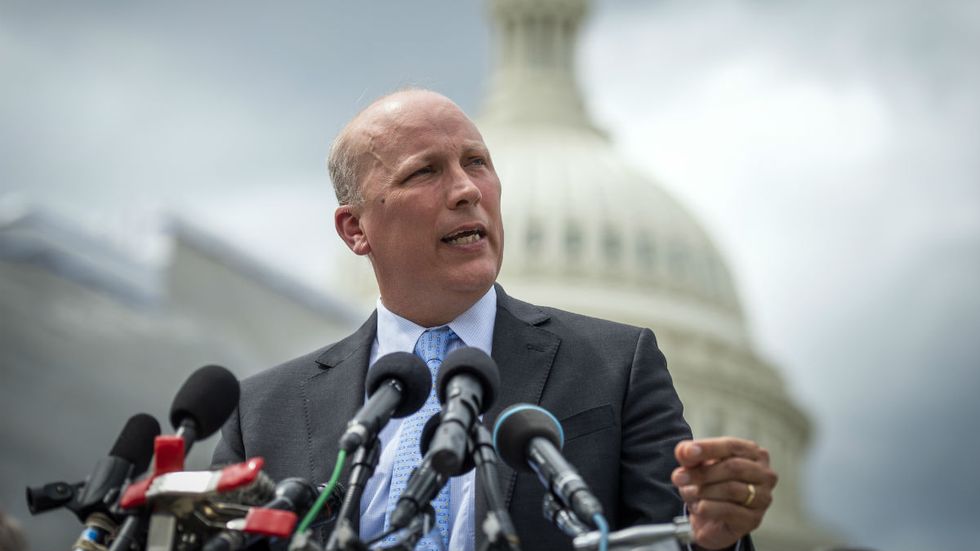
© 2024 Blaze Media LLC. All rights reserved.
House Republicans release a health care plan that aims to finally end our insurance nightmare
October 23, 2019
Earlier this year, President Donald Trump vowed that "the Republican party will soon be known as the party of health care." Republican lawmakers have now put forward a lengthy plan in an effort to realize that prediction.
On Tuesday, the Republican Study Committee released "A Framework for Personalized Healthcare," an Obamacare replacement plan with the goal of driving down costs and improving access to care in a way that prioritizes individual choice over top-down government regulation.
"If government-run health care were the answer, the Veteran’s Health Administration (VHA) would serve as the gold standard," the summary says. "Of course, it does not. ... Does anyone really believe Washington bureaucrats could be trusted to manage the individual care of hundreds of millions of Americans?"
So what would the overall plan do? In order to understand that, it's probably best to start with a brief refresher on the overall structure of Obamacare.
The four key parts of Obamacare — as explained previous CR article — are:
Regulations: These mandate that companies expand coverage to more people and benefits, therefore sending the cost of insurance skyrocketing.
Subsidies: Because the insurance is now unaffordable as a result of regulation, anyone below a certain income level is subsidized to purchase medical insurance.
Medicaid expansion: In addition to subsidizing non-Medicaid patients to purchase unaffordable medical insurance (thanks to the regs), Obamacare dramatically expanded both the eligibility and the federal subsidy rate to the states for Medicaid in order to cover more people.
Tax increases: Tax hikes were meant to fund the venture, and the individual mandate penalty was meant to keep young and healthy people from gaming the system by only paying for insurance if and when they needed it.
So what does the new RSC plan do differently?
First it seeks to remove the regulations that made health insurance so expensive in the first place, while allowing states to implement them within their own borders. However, regulations that force companies to issue insurance and not exclude high-cost-and-risk factors from coverage "would be retailored" under the plan.
Instead of Obama’s regulatory-subsidy combination, the RSC plan would seek to address costs for more expensive patients through state-run “guaranteed coverage pools,” under which "health care costs would be subsidized with federal grants and further contained by any state-enacted premium-setting restrictions."
Insurance portability is "the cornerstone" of the proposed framework's goal of "neutralizing the issue of pre-existing conditions," according to the document. In this case, portability means people's ability to take their insurance with them if they change jobs or states.
"Enhancing portability is critical for purposes of preventing breaks in coverage, during which time an individual could develop a medical condition posing an impediment to obtaining health insurance," the plan reads. "In this way, continuous coverage can be a de facto safeguard against pre-existing conditions, so long as the operative legal backdrop ensures that coverage protections are portable."
The framework would also seek to create equity in the taxation difference between paying for private plans and those offered by employers.
"A person choosing to purchase health insurance with income from their paycheck is at a significant tax disadvantage versus a person receiving employer-sponsored insurance. When an employer spends money to purchase a plan for an
employee, the employer does not have to pay payroll taxes on the benefit nor does the employee pay payroll or other federal and state income taxes on the benefit. On the other hand, if an employee seeks to purchase individual coverage, the funds they would use to do so are subject to each of those forms of taxation."
One way to address this disparity, the RSC says, is by allowing people to pay for private insurance premiums out of tax-free Health Savings Accounts (HSAs) as opposed to their taxed income.
The plan would also expand HSAs, so that they could be also used for other services and products that currently have to be purchased with after-tax income; these include market-disrupting health care approaches like direct primary care, telemedicine, and health-sharing ministries.
Chip Roy, a freshman House conservative and cancer survivor who has been working for months to forge a new conservative narrative on health care policy — hailed the release of the plan at a Tuesday press conference.
Roy said that, in addition to addressing costs, access, and portability concerns, the framework would also "end the pre-existing [condition] problem before it starts; you shouldn't be trying to solve this on the back end."
"We should make it to where people have care because they're able to pay for it and go into the market and and buy it just like you do any other service — food, shelter, clothing," Roy added. "Nowhere else do we regulate it to death so you can't get access to it."
#mc_embed_signup{background:#fff; clear:left; font:14px}
/* Add your own MailChimp form style overrides in your site stylesheet or in this style block.
We recommend moving this block and the preceding CSS link to the HEAD of your HTML file. */
Want to leave a tip?
We answer to you. Help keep our content free of advertisers and big tech censorship by leaving a tip today.
Want to join the conversation?
Already a subscriber?
more stories
Sign up for the Blaze newsletter
By signing up, you agree to our Privacy Policy and Terms of Use, and agree to receive content that may sometimes include advertisements. You may opt out at any time.
© 2024 Blaze Media LLC. All rights reserved.
Get the stories that matter most delivered directly to your inbox.
By signing up, you agree to our Privacy Policy and Terms of Use, and agree to receive content that may sometimes include advertisements. You may opt out at any time.



